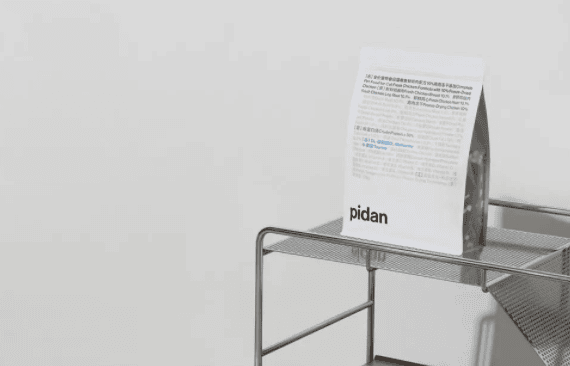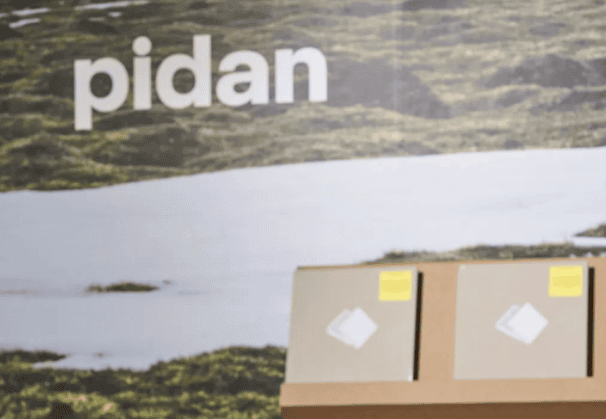Using a curatorial space to develop a brand narrative can no longer satisfy the desire for expression of pet lifestyle brand pidan.
On December 10, pidan’s first self-operated cafe “sorry dog” in Shanghai officially opened. Quoting pidan's own introduction, sorry dog is a "cat-friendly" coffee brand affiliated to pidan. It focuses on providing comfortable travel destinations for people and pets, so that people and pets can enjoy a cup of good coffee with peace of mind.

But in our understanding, this cafe is not It is simply used to sell coffee. It is more like a large three-dimensional advertisement for pidan, allowing people inside and outside the industry to come and talk about how a company selling pet supplies can use the daily scene of a cafe as a communication carrier to actively explore offline. Different possibilities for pet lifestyle, brand connection field and stylized expression. There are many stores that combine coffee with pet-friendly themes to attract customers, but we can see that pidan’s “sorry dog” cafe is not just opened for “taking photos and checking in”. Specifically, being able to truly treat pets as guests is one aspect. Based on the concept of "cats are more friendly", pidan teamed up with SpaceStation Architects to divide the overall space of the "sorry dog" cafe into two areas: "cats" and "dogs and other pets". There is a basis for doing so. Compared with dogs who are more in need and suitable for going out, whether cats are suitable for going out depends largely on the timidity of different cats, whether they have received reasonable socialization training and whether they have met the requirements and are suitable for going out. The environment in which cats go out is equally important as giving cats a sense of security and allowing dogs to have a relaxing and natural environment. Let cats be cats and dogs be dogs. Although the actions are small, they reflect Pidan's understanding and acceptance of cats and dogs. Being able to further accommodate the relationship between people, pets and nature is another sincere response to the "pet-friendly" nature of this space. Returning to cats’ nature of climbing and being curious, pidan has installed a large number of cat-friendly facilities such as artificial wooden hillsides, seemingly thin seats, low lighting systems, etc. into the cafe to add interest to cats in exploring. It also allows humans to intervene in the cat's empathetic perspective through deliberately creating "inconvenience" and regain a way to understand the cat's needs. In addition, indoor seats are equipped with emotional soothing private cat boxes for nervous cats, friendly items such as cat bowl holders and leash buckles are installed at the light poles, as well as "touchable" and "don't touch" items to avoid passive social interaction. "The design of infrastructure and comprehensive services such as two types of signage makes "pet-friendly" a traceable feeling and experience. Unlike decorative decorations, sorry dog also pays great attention to the details of the relationship between the space and the surrounding environment. Introducing the concept of naturalism, sorry dog has planted large-scale pet-friendly plants such as miscanthus, pink grass, and Mexican feather grass both outdoors and indoors. While ensuring the natural beauty of the space, it also relies on the seasonal cycles of plants to appreciate. It revitalizes the harmonious connection between the entire space, plants and land, and naturally becomes a part of the surrounding ecology. It also allows people and animals entering it to feel the relaxation and joy of being embraced by the energy of plants. With the help of embedded content and interaction, the "sorry dog" cafe is also a freely editable expression space. At the same time as sorry dog opened, pidan put the opening ceremony of graphic designer Yui Takada's "Order of Chaos" into the space. The sharing and conversation between brand founder Ma Wenfei, sorry dog space designer Wang Zheng and curator Zhao Mengsha lead us to perceive the world that the brand wants to explore, and also leave ample room for interpretation by pidan. As more and more people are willing to become "poop shovelers", "pet-friendly" is no longer a new topic. It can be a series of products, consumption and services around pets, or it can be a new era of homogeneity in the business scene. "Face" can also be a bonus point for brand values... However, "sorry dog" presents us with much more than that. It also inspires us to think about new possible relationships between people, animals and nature. Exploration - In an open public space, the relationship between people, people and animals, and people and nature is not only a harmonious relationship, but also a "sustainable co-construction". From igloo cat litter boxes to mixed cat litter and safe cat food, pidan has entered the pet supplies track with products that take into account both cat experience and human feelings. It has always been full of hits and topics. However, in the current era of uncertainty, such a pet products consumer brand, before it has officially laid out any offline flagship store, would rather spend time and energy to polish a place that expresses more pet-friendly possibilities. Space, I think, is not just an interesting attempt to attract attention. Behind this, one possibility is due to consumer trends. According to data from the "2023 China Pet Content Value Research White Paper" released by iResearch, the scale of the domestic pet consumption market is growing rapidly, with the market size in 2022 being approximately 311.7 billion yuan; the pet consumption market will continue to grow in the future, and the market is expected to be 2023. The scale is approximately 392.4 billion yuan. At the same time, pet owners who are becoming younger, more highly educated, and have higher incomes have promoted the diversification of pet-raising methods. Traveling with furry children and taking photos and checking in are gradually becoming a popular pet-raising routine nowadays. On social media software such as Weibo, Douyin, and Xiaohongshu, there is also a strong demand for traveling with pets. To a certain extent, building a pet-friendly space can actually provide certain opportunities for brands like pidan that pursue new possibilities to enhance their brand influence. On the other hand, it is Pidan's practical need to face the future and expand brand penetration. With this intention, pidan will seriously invest in animal welfare. Using the pidan care project as a carrier, for every product sold by pidan, RMB 0.15 will be transferred to the pidan care public welfare account for the rescue of stray animals. According to official data, as of 2022, pidan has donated a total of 1 million yuan in cash to help more than 120 rescue individuals or institutions. The types of support include sterilization support, adoption support, food support, medical support, etc. What’s important is that such common-benefit actions are not a brand’s “self-movement”, but a sustainable, replicable, and public-participable self-circulation process that is constantly optimized and adjusted in practice. In addition, pidan will also produce content. At the end of last year, pidan launched its first brand publication "Indistinguishable Everyday Life". In the first issue, pidan invited 32 creators, including artists, photographers, writers, etc., to intercept fragments from individuals' repetitions and record them. Daily life related to small animals. These private images that exist in the creator's life are recorded in different media forms such as text and images, and ultimately form an affectionate world related to small animals.
Before the independent publication of the brand, pidan also specially opened up its own curatorial space "pidan Gallery" with the intention of collecting some "beauty and creation" and holding diversified exhibitions from time to time to build "beauty" for consumers. and create” an immersive experience. Among them, the exhibition in February this year is titled "I See Animal See Me". Through works such as the history of interactions between animals and humans, and the phenomenon of animal migration in contemporary times, it opens up new possibilities for the relationship between humans and animals outside of mainstream narratives. discussion.

pidan also has plans for the currently popular "neighborhood connection". In March this year, pidan launched the "Ronghua Street Project". As a long-term pet-friendly plan, pidan hopes to start exploring in the form of pet-friendly maps, continue to improve and implement the concepts of pet-friendly and two-way friendliness, and connect more pets. Friendly store partners work together to expand the territory of the "Velvet Neighborhood Project", and also allow small animals to receive friendly care and acceptance without affecting other people when they go out, arousing goodwill connections in urban neighborhoods. Animal welfare, brand publications, curatorial spaces, neighborhood connections, pet-friendly cafes... seem to have little to do with the brand focusing on pet products, but putting them one by one on pidan has become the identification index of pidan. You can tell at a glance that this is a pidan. In the short term, this series of brand systematic expressions may not bring direct commercial transformation to pidan, but in the longer term, they can enable pidan to be involved in the industry and between brands. Under the background of highly homogeneous operating models, the brand value system is gradually accumulated, the style is formed, and the influence and penetration of the brand across time are achieved.



 扫一扫微信交流
扫一扫微信交流
发布评论